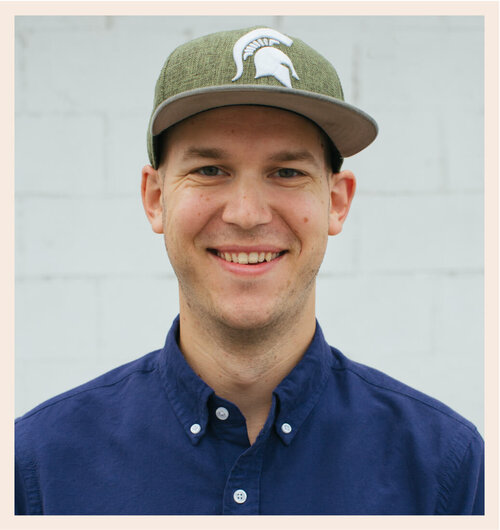Caleb Wojcik is a filmmaker, podcaster, author, and internet entrepreneur who has produced films for successful internet marketers. He is a pro at creating and growing internet businesses with a focus on web videos and is qualified to offer advice on the importance of utilizing videos in marketing efforts. He has been helping others launch journals, make a living online, and commit to entrepreneurship.
Filmmaker, podcaster, author, and internet entrepreneur Caleb Wojcik also produces videos. He previously co-founded the website Fizzle.co, which offered online marketing training, and served as presenter of the podcast The Fizzle Show for independent thinkers and company owners.
Additionally, he is the creator of the DIY Video Guide, in which he offers website owners professional guidance on how to produce videos. Caleb is a pro at creating and growing internet businesses with a focus on web videos. He is qualified to offer advice on the importance of utilizing videos in marketing efforts since he has produced films for some of the most successful internet marketers in the world, including Pat Flynn and Amy Porterfield.
Caleb and Easyspace recently spoke with one another.
Caleb, tell us about yourself and how you got to start earning money online.
After graduating from college, I spent three and a half years working in the corporate sector before starting my MBA program. This was all done while I was going through the 2008–2011 recession. I managed to keep my job despite my firm making cuts. I started reading blogs about entrepreneurship around this time. people like Pat Flynn, Tim Ferriss, and Chris Guillebeau, among others. In December 2010, I started a personal financial blog on PocketChanged.com, and nine months later, I started working with Corbett Barr at Think Traffic (now Fizzle.co). I’ve been helping others launch journals, try to make a living online, and fully commit to entrepreneurship ever since (for the past three years).
How long did it take you to start making enough money online when you initially tried to support yourself?
I started writing in December 2010, but I was never able to make a reasonable salary from it thanks to that website. I instead started working for another internet business owner. I didn’t launch my own video production studio until recently, more than three and a half years after I first started teaching and selling online things.
I provide training on how to make and optimize online videos at DIYVideoGuy.com. I help them improve their video production, marketing, and overall strategy whether they are currently doing videos or are just starting out with writing and podcasting.
You’re familiar with hosting recordings on websites, right? How can having a podcast assist a website, and how challenging is it to create one?
With the use of podcasts, your audience can learn more about you. They listen to you talk for 30 to 60 minutes each week rather than reading your words for a few minutes. They get to know and trust you quickly. Producing podcasts is challenging because you require top-notch tools, a dedication to regularly delivering new episodes, and the ability to pique listeners’ interest above all other podcasts.
What are the essential steps needed, in your opinion, to design and construct a successful website?
The most crucial component of developing a great website is consistently publishing top-notch content. You’ll be known if you continuously create top-notch work.
How did you begin into making videos, and what are some advantages for websites? (such increasing website traffic and revenue, for instance). How difficult is it to make them?
I played with video throughout college, but I didn’t really get into it until we started making a lot of video training for Fizzle.co. In my perspective, videos are better than recordings since they can be trusted to be real. Just be who you are. And as a result, there may be more clarity, improved trust, etc. Videos need a lot more work, however this isn’t always the case. Start by utilizing your phone or screen capture software to record your voice.
Website content may be divided into three main categories: textual (like blog entries), audio (like podcasts), and video. What recommendations would you make for deciding which of these to use on a website? What situations make one better than the others?
The type of material will ultimately determine whether to use textual, audio, or video information. Written works well for essays, in-depth manuals, etc. The greatest way to record conversations, many voices, etc. is through audio. Video is fantastic for making a single point and showcasing character and humor. It is reliant.
What’s it like to run your own company? What is your everyday schedule?
I get up quite early. 5:30 or 6am. I then try to keep a notebook and write 1,000 words that could be published. I have breakfast, plan my day, and check my email and other online accounts. For big projects, I try to split my day into three or four 90-minute chunks. till 4, 5, or 6 o’clock. Exercise (such as rock climbing, surfing, or weightlifting). Dinner. Read or watch a movie. Bed. Repeat.
Which entrepreneur most motivates you and why?
It is impossible to pick just one. Chris Guillebeau, in my opinion, held the most sway in the beginning. I bought the blog domain so I could tell him in person while he was on his book tour. Everything began with that.
What suggestions would you provide to someone thinking about starting their own internet business?
By working with a mentor, you may experience what it’s like to run a successful business in real life. Without really witnessing how a real firm runs, you might make far too many assumptions about how to “get rich”.
For further information
You can check my website or my Twitter
Main pic is from here
We gather unique business case studies from all over the internet, to inspire you with a wide range of business ideas. This case study was supervised by our team and it definitely caught our interest. You can find other inspiring business stories here.







